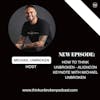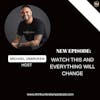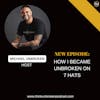Uncover Your Greatness and Live Incredibly Full Everyday with Martin Salama
In this episode, we explore the incredible success of Martin Salama, known as The Architect of The Warriors L.I.F.E. Code... See show notes at: https://www.thinkunbrokenpodcast.com/uncover-your-greatness-and-live-incredibly-full-everyday-with-martin-salama/#show-notes
In this episode, we explore the incredible success of Martin Salama, known as The Architect of The Warriors L.I.F.E. Code. Martin specializes in helping people who feel lost and frustrated in their lives to quickly shift their mindset and uncover their true potential. His coaching program, The Warriors L.I.F.E. Code, has helped many clients, like Roberta, who lost her job due to COVID and came to Martin feeling depressed and directionless. Through Martin's guidance, Roberta regained focus, renewed energy, and a sense of purpose. Join us as we discover Martin's approach to mastering the ability to Live Incredibly Full Everyday (L.I.F.E.) and learn how you too can uncover your greatness and live your best life.
************* LINKS & RESOURCES *************
Learn how to heal and overcome childhood trauma, narcissistic abuse, ptsd, cptsd, higher ACE scores, anxiety, depression, and mental health issues and illness. Learn tools that therapists, trauma coaches, mindset leaders, neuroscientists, and researchers use to help people heal and recover from mental health problems. Discover real and practical advice and guidance for how to understand and overcome childhood trauma, abuse, and narc abuse mental trauma. Heal your body and mind, stop limiting beliefs, end self-sabotage, and become the HERO of your own story.
Join our FREE COMMUNITY as a member of the Unbroken Nation: https://www.thinkunbrokenacademy.com/share/AEGok414shubQSzq?utm_source=manual
Download the first three chapters of the Award-Winning Book Think Unbroken: Understanding and Overcoming Childhood Trauma: https://book.thinkunbroken.com/
Join the Think Unbroken Trauma Transformation Course: https://coaching.thinkunbroken.com/
@Michael Unbroken: https://www.instagram.com/michaelunbroken/
Follow us on TikTok: https://www.tiktok.com/@michaelunbroken
Learn more at https://www.thinkunbrokenpodcast.com
Listen more about Martin Salama at: https://connectwithmartin.com/
Support the Podcast: Become a listed sponsor!
Follow me on Instagram @MichaelUnbroken
Learn more about coaching at https://coaching.thinkunbroken.com
Get your FREE copy of my #1 Best-Selling Book Think Unbroken: https://book.thinkunbroken.com/
Michael: Hey! What's up, Unbroken Nation! Hope that you're doing well. Very excited to be with you today with my friend Martin Salama. Martin, my man, how are you? What is going on in your world?
Martin: I am fantastic and everything's going on in my world because I look at everything as a great day and how to make it even better.
Michael: Yeah, I love that. I mean, one of the things that, in researching you and coming on, you know, here's the thing about life coaches, man, and I know you are one, and we're gonna get into it, we're gonna talk about why we do that. But as one, and really I think of myself more as a transformation coach, more than anything. We have done this for ourselves first and I think that's one of the things people really don't understand when they go and they look at people who are in the coaching space or the teaching space and it's like, yo, I had to do this sh*t for me, and that's very much your story. And so, as we dive in today, I would love if you give us a little background about how you got to where you are today.
Martin: Yeah, absolutely. But you know, the best coach in the areas that they understand. You can't coach somebody if you don't understand the steps that they've taken. Doesn't mean you've gone into exactly the same footsteps, but you've had similar journeys and they're coming to you because you get that and how do you get them is because you lived what they lived through in a different way, but similar.
Michael: Yeah. It's always different and you know, to me, I'm like, if you want to be a bodybuilder, like I've never been a bodybuilder, I can't help you with that, but I can help you with the mindset about it. I can help you overcome the procrastination and the struggle in it. And I think that's been a big part of your journey too. Like how did you get there?
Martin: How did I get to where I am today?
Michael: Yeah.
Martin: So, I think I have to start from when I was a kid, from when I was 10 years old, because I look at my life now that they were defining moments. Okay. And you don't realize them when they're in the moment. Most of the times you're like, oh my God, that was a time where my life change and I made decisions based on what happened. And for me, it started at 10 years old and which is almost 50 years ago. I was walking home from school with one of my sisters, one of my four-year older sisters, and there was a school bus stopped in front of our house only to find out that the bus had stopped and the bus driver was standing in front on the sidewalk, because then the next thing I saw was my mother running out, carrying my five-year-old brother Michael, in her arms, jumped in the car and drove away. When my brother Michael got off the bus, he's five, he dropped something in front of the bus, the bus driver looked, didn't see him, and drove. And four days later, my brother passed away from those injuries. And the reason I say that was a defining moment. It was the most tragic day of my life and hopefully I'll never have anything tragic come close to that. But it was even more tragic for my parents losing a child. And we were all distraught, but as a 10-year-old, I told myself, it's now my job to carry on the legacy on my own.
I was looking at me and my brother, we were gonna set the world on fire together. Now that was gone and I said, I have to make sure that my parents never feel anything like that again. And I decided at that moment that it's my job to make them happy. And I could look back now and say that's when I became a people pleaser. And that set me on a goal on a journey for the next 40 years of always trying to make everybody happy. And you know, what comes with those things as being a people pleaser for me? I had a short temper. I was a control freak. I took everything personally. And at the end of the day, really what it was all about was because I wanted the attention for the pleasing that I was doing. Why you're doing such an unbelievable job. Thank you. Thank you, thank you, thank you. Well, the validation, the recognition that comes with that. And I wanted my parents, specifically my father's recognition for that. And it took until a few years before he passed that I got that recognition about 10 years before he passed, but it was still, you know, hard to always do that.
And then in 2008, the world fell apart and that time I was working on a project for five years to build a multimillion-dollar health club in Tennis Center in New Jersey. And that came about because in 2003, I'd closed a business and my wife said, you know, you're looking for something to do. I can't find any time to play tennis I just started playing tennis, let's open tennis courts. The people believe in me said, okay, I wanna make my wife happy, and we went on a five-year journey to do that. Three plus million dollars later, we get all the approvals and it's a long story of how we got there, got all the city approvals, go to the banks I'm like, okay, we're ready to borrow now, you said when we're ready, you're gonna be there, that was in 2006, 2007, they weren't lending anymore. I was like, what? What are you talking about? Month later, Bernie Madoff subprime loans, the world turns upside down and so do I. I stopped paying my mortgage, I stopped paying my car payments, about two months later, my son calls me, he says, dad, look out the window, they're towing away your car, I was being repossessed, I never had that before in my life. And you know, eventually they took the house ‘cause they foreclosed on it but in New Jersey it was so backed up it took a few years for it to happen, but they took it and that was a kick in the pants like you cannot believe. And just when I thought I was getting over it, I decided, okay, I'm gonna do something else in my life and I'm gonna become a life coach because I was always helping people, I was always in that people blazing mode. So, I was always involved in community events, but I was a leader too, when I was like, guys, just gimme a little time I'll show you what you can do. And about two months before coaching started, it was my 24th wedding anniversary, my wife said, I'm done. I want a divorce. I'm like, oh my God, how much more can happen to me? Because that's how I was looking at everything that the world was against me. And I was like, okay, I'm gonna go to life coaching anyway. And I think God was sending me a message saying, Martin, you gotta get your stuff together. Here's your opportunity, and they gave me a couple of books to read before they said, read one or two of these books.
One of them was The Four Agreements by Don Miguel Ruiz, which is a life changer for me. When I read, don't take anything personally, I was like, wait a minute. I don't have to have the world on my shoulders. I don't have to please everybody. Wow. What a concept. And then I went in and I said, okay. And they said to me that first weekend, you don't have to stay with who you think you are. You can change those things that are not working and that got me going.
Michael: Man, a lot of thoughts here. And the first thing that comes to mind is, you know, losing somebody at such a young age, I would have to assume, especially if it's a sibling, it's almost impossible to not want to have that hurt, be experienced in your family again. And you know, I had this weird experience as a kid of, with going through all the violence that I went through and all the pain and hurt and trauma where it's like I just, I desperately wanted people to like me, right? And I realized that the more I tried to get people to like me, the more they didn't, which was really interest. And its fascinating juxtaposition because on this one hand you're like, okay, I feel no valid experience of any kind, except when people are giving me admiration, but they never give me admiration ‘cuz they're always like, dude, get away from me, you're very annoying. And like being annoying has been a trait that has served me well in business but in life until I understood it, it didn't really Right. And I think so much the way that I look at the world is scope through those childhood experiences, because they always lead us to where we are. And yeah, look man, your life can suck a lot but it can also be really beautiful. And I've had both sides of the spectrum and I think probably the thing that I've realized more than anything is like life is in percentages, right? And I'd say 5% of life is really awful, and 5% of life is really great and the other 90% is just kind of in the middle. I'm not saying it's bad or great or I'm just saying it's just kind of life and I think that you reading that book, I read the four agreements as well, it didn't hit me as hard. Right. Cuz we all have our different thing. But what hit me when I did read it was the same thing. I was like, yo dude, it ain't all about you selfish a**. Right. You know, you doing things for other people isn't about you. I mean, it is kind of, right. I mean, anyone who's like Mother Teresa was a saint. I'm like, okay, cool. But she probably had a giant ego, you know what I mean? Like how could you not? And so, I'm like, when the world is impacting you, and this is my opinion, you have to be willing to look at it and go, where's the opportunity? And so, I want to go back, you said something that actually hit hard for me. I got my car repossessed as well when I was, I guess I was 23, might have been 24, making 150 GC a year. Right. And just somebody, they're like, dude, you're not paying your bills. For me, it was probably not the same experience as you. For me, it was just I wasn't responsible. I didn't understand money. I was parting my face off. I was in massive debt and I was like, oh, I saw my mom's car get repoed. I guess this is just normal.
When you're in that moment, you're going through that ‘cuz so many people are always in this place where they're like, man, I'm facing all these setbacks and God hates me and the universe wants me to not even be here and blah, blah, blah. Like, here's what's crazy about your story. Most people would not still go be a life coach, right?
Martin: Well, it happened like in 2008, and it wasn't until over a year later. I'd gone through some therapy and I'd gone through some coaching, you know, and I was able to come through that, those things and say, okay, I gotta put my life back together again. All right? And I looked and I realized that what I loved to do best was help people, maybe it was the people pleasing part of me, it was the community thing. I was the founder of the first synagogue of Eatontown, New Jersey that at the time I'd wake the guys up on Saturday morning, we need 10 guys to make the services work. And now there's over 400 families in that synagogue and it's because of the work I did back then. But I knew that I could inspire, I can do those things, I can get people going and I can show people what they don't see in themselves that I see in them.
Michael: I need to pause you real quick cause I want to go in that little bit deeper. How did you find that in you first though, especially with all that chaos?
Martin: I think because of my 40 plus years before that, I've always been involved in community events and seeing success after success, and now I realize it was because I had no emotional attachment to the end of the success, which is something I coach around in my coaching practice is that when you put emotional attachment towards the success, that's when failure happens. So, I always had the attitude of, well, hope for the best, but expect the worst in any type of things I did in community events, in fundraisings and all that. Because I said, all I can do is give my best and then sit back and let happen what could happen. And 98% of the time they were successful because I gave it my all and I attach myself to the outcome. So, as I was going through this therapy and coaching, I was like starting to peel away these layers. So, it started before that, and it was about clearing out the chaos and focusing in where do I want to go? What do I want to happen next? I'm tired of being in businesses that succeed, succeeded, failed, succeeded, failed like a freaking rollercoaster. So, I said, I gotta find something that makes me happy as well and that's where that came from.
Michael: Yeah. Happy is an interesting word, because I think it's one of those words that people leverage all the time without really understanding and this has been my experience, that happiness is just like, I can be happy 36 times in one day. You know, and I can be in a bad mood 112 times in one day. And I think people look at their life and they go, man, my life isn't that good ‘cuz I'm not happy all the time. And I'm like, bro, nobody's ever happy all the time. I mean, you look at some people and I do believe you control your state. I do believe you control your emotions. I do believe that you, but like you cannot go through these traumatic experiences and be like, I'm happy about it like, that's just nonsense, right?
Martin: No, it's not possible. And it's so funny because so many people think life coaching is about making people happy all the time. No. I talk about building your emotional strength, that doesn't mean never get mad. It means when you're getting mad, respond instead of react, right? Because I was a reactor. I reacted every time I got mad to the point, there was like a nuclear reactor. I was leaving fallout all over the place. Right? And then I'd have to go back and apologize and usually my apologies were like those, I'm sorry I did that, but you know, this was going on, that was going on, you pushed my button, that's not an apology. I coach around understanding what anger's about, what sad this is about, and work through them. Don't ignore them because that's not gonna help. Don't react because that doesn't help either find that balance. If the right coaching is about understanding all of your emotions and working through them.
Michael: Yeah. And I think, one of the things that I discovered about myself that has helped me tremendously, which people pointed to a lot that I just ignored, was that I was always reacting to things. And then when I would blow up because you know, it's so funny, I look back, take me back 12 years, 15, 20 years ago, man, I was just a completely different person, completely different values, completely different identity. And the most small, minuscule thing would make me want to burn your house down. And then there would come to pass this moment where I'd be like, oh, wait a second. Dude, that was actually really stupid, that thing you said, that thing you did, the way you behaved, the way that you acted. But I would always, my apologies then were very much like, I'm sorry you heard about it, I'm sorry, you are upset about it. And I realized like that's what I was taught, I was taught other people's fault. I was taught that it's always on them it's not on you. You know, blame the world, the government, the president, the school, and I was like, wait a sec. No dude, this is your fault. Your relationship sucks. It's on you. The finances suck. It's on you. Your body's not in great health. It's on you. And that's hard, man. And I'm wondering when you have to face that in yourself what's that journey like for you even today?
Martin: Well, today, because I've conditioned myself and literally, I was like a Pavlov dog when I went through this, you know, I conditioned. I taught myself to change the way and thank God I can say I'm now happily married to someone else for five years. And when she hears stories about the old me, she’s like who was that guy? You're never gonna meet him. He's dead. All right. But so, what happens now is do I never get mad or freak out? No, of course not. There were times that it happens, but instead of it being 90, 95% of the time, it's more like 5% of the time, and in the other 95% when something comes up, I take deep breath. I say, is this affecting me personally? Am I taking it person? Or is it something going on with them that they're projecting onto me? And you know, it's unbelievable how I used to react. And now people look at me like, okay, what's your answer? I go, well, I gotta think it through, you know, they want a snap answer because they want you. You know, I recently had something where a guy came to me and they were arguing with me, and I just kept calm. Eventually he came down to my level and spoke calmly because I didn't jump up to his level of getting elevated in the conversation. And I looked back and I was like, wow, that's crazy, I gotta do that more.
Michael: It's funny to me, you know, it's easy to be explosive, right? And people really justify it. I put this rule in my life probably six years ago. And I put this rule in my life and I said, no one's ever allowed to yell at me under any circumstances, and in reciprocation I do not yell at people. Like, it's hard fast, it's a no. The first time I'll be like, yo, we gotta talk about this. Not okay. The second time I'm like out, because I've realized, like we communicate in the same styles that we're taught, that we are exposed to as children that we grow up in. I mean, even our teachers yelled at us. And I know, I come from this age in which the teachers could still hit you and I'm like, wait a second that doesn't benefit anybody. So, if you're spending your life thinking violence and verbal outburst, and that is the way you communicate, like that's a weird way to look at the world because when you look at it now, like to me, the idea of yelling at someone is so asinine because that means you have no idea how to control yourself. And you talked about coaching and anger and I love this topic because man, I can't tell you how many times people have like, you're angry all the time and I'm like, I know I hate the world and I'm like, wait a second, maybe it isn't that. I heard this quote, God, I wish I could remember who said this ‘cuz it was one of the most beautiful things I've probably ever heard in my life, they said, “you have no idea how much violence I had to experience to find this much peace.” And I remember sitting and dude, it just hit me so hard. When you're coaching and you're guiding people through anger, like what is the thing that they don't understand?
Martin: Well, one of the things is, is they don't understand is what you think of me is none of my business. Right? It's like, I don't care what other people are thinking. Don't tell me what you're thinking of me because that means you're trying to get a reaction out of me. And most of the time people will react to it and the people that are doing it, they're gonna rationalize that it's okay, you talked about justified before it's the same thing. I took the word rationalize and now I look at it and I rationalized all my life that everything I was doing was for the greater good, or I was for this reason or that reason, and I broke it down and you have my cards in front of you. One of them talks about the word rationalize that I took it into I've broken into two words, rational lies, and that's how I look at it. It's rational to tell yourself that goes against you against what you believe because you wanna please somebody else or you wanna, that your ego talking or whatever, but it's a lie. So, it's rational that you're saying this lie to yourself so that you can get through whatever it is that you want to get too.
Michael: What part of it is the lie though?
Martin: Well, for example, I'll make it on a simple level. You decide you wanna start exercising almost every day, and then you wake up one day, you go, you know, I'm too tired today, I don't really feel like exercising. So, are you giving up on yourself and saying, ah, I'm gonna let myself do that? Or are you saying, really, I knew need to get up and I know if I'm 10 minutes into it, I'll start enjoying the exercise. So, are you telling yourself a rational lie on a simple level of saying, I don't wanna exercise today. Just admit it, don’t say I don't wanna exercise, don't say I'm too tired.
Michael: Yeah, literally just today I posted stop f**king lying to yourself. You know, ‘cuz there's always something, and someone commented, they were like, why should I do that? And I said, do you want to be successful and love yourself? Because if you're lying to yourself, I don't know how you get there, because I was a great liar, you know, and a lot of that I learned, I literally learned how to be a liar from my mother. Like I just watched her lie her way out of everything or into everything like she was so manipulative and conniving, like those are literally the words I'm using ‘cuz that's what I bore witnessed to. And so, I became this masterful lie, it's unbelievable how good I became at it. The worst part about being great at lying though is you have to lie to yourself first. And when I understood what was happening, like when I was destroying my life, burning it down around me, I was like, let me look at the values I have, like, who am I really? And I realized I had to actually make a decision to choose honesty as my core value, my number one core value.
Martin: Wow, that's huge.
Michael: Dude. It was to this day, it's uncomfortable.
Martin: Yeah. And you know what, when I was a kid, I was a master liar as well, but you know what, most people, they sell so many lies that they forget the different lies that they tell and they end up getting caught up in the lie. But a master liar knows how to tell the exact same lie to everybody so that they can never get caught if they're really good at it. And that was me. I would tell the lie and I would tell everybody the exact same lie. So, I believed it myself after a while, because this way if somebody caught me, they're like, but you said this no, no, I said the same thing every time. I was very good at that.
Michael: Here's what's interesting about that because here's the juxtaposition. There's always a dichotomy in life, always. I believe to some extent you do have to lie to yourself to become who you're capable of being, because you have to have the arrogance of belief. Here's what I mean by that, I'll go into this ‘cuz I think it matters ‘cuz it's this weird, it is a – know thy self. I think you have to be massively cognizant of who you are, right? And I think that's the only way this works and that starts with honesty. I think you have to, maybe convinces a better word than lie, but you have to plant a seed in your own head that you're capable of doing something that fills impossible and believing in yourself beyond any shadow of a doubt that you can do it.
Martin: All Right. I get what you're saying, but I don't know if the word lie is the right one.
Michael: Yeah. And maybe it's not the right word, but to me it's like you have to f**king trick yourself into believe.
Martin: Trick yourself, that's what it is. You know, like hypnotize yourself to do it. You know, trick yourself, say, I can't do this, every time you say I can't, you're telling the truth to yourself and every time you say I can, you're telling the truth to yourself, that was one of the things I go over how often I used to say I can't. And when I'm talking with clients, I tell them, the more you say I can't, the more you get nowhere in life because you're convincing yourself that the world is crap and I can't do anything about it, and I can't do anything about myself. Just change it to how can I and figure it. Oh, I can't afford that car. Okay. How can I afford it? What can I do and what am I willing to get outta my own comfort zone to get what I want? That's the difference. Pushing yourself out of your comfort zone.
Michael: Yeah, and I think part of it is putting yourself in a position where I think Martin, the only way things change is you have to like literally force them. You know, as you and I are talking, I showed you before recording, like my life is packed up in boxes in front of me right now to transition and go into a space of unfamiliarity, of discomfort, but of possibility because I believe a huge part of this journey is like you've gotta put yourself into places where you gotta find out who you are. And I'm wondering like, as you're in this, what do you find in people that you work with in their discovery? Like what are they learning about themselves in the transformation, in the transitions?
Martin: Yeah. I think a lot of it is them understanding they have to get comfortably uncomfortable, and that means being willing to say the things that haven't worked for me in the past I've gotta change, the things I thought were default tendencies I have to change them if I want what I want. And I love it when I'm with a client and all of a sudden, they come back one week or two weeks and they're like, I get it. Oh my God, I tried this trick, I tried this system you gave, this program you put into place like build your emotional strength and it worked. I'm like, yeah, but here's the difference, it's only gonna work if you keep on doing it, and you keep on reinforcing it, otherwise it's just a one and done.
Michael: How does that apply to your life?
Martin: Well, it applies to my life in a lot of ways because every day I'm finding myself challenged with am I gonna react or am I gonna respond to things that come up? You know, I'd like to say that everything's great with my ex-wife and stuff like that, but there's times that I want to just like, ah, you know, come on, we're divorced 10, 12 years already. Can you get it now? But you know, and I hold back because I know that deep down, she's trying to push that button because that was the button she always pushed. And it used to be she'd say to me, I don't wanna fight, but and that was a button for me to say, okay, ding, ding, ding, let's get up, not physically, but let's start fighting, you know, yelling at each other. And at the end of the day, she'd say, but I told you I didn't wanna fight, but you started to fight. And I finally realized she was making me start the fight so that I could be the bad guy. So now when she doesn't do that anymore because I conditioned her outta that. But there are times she'll call me up and she'll say, you know, there's this going on and that going on. I'm like, if there's something going on with one of our kids, if they don't bring it up to me, it doesn't exist. And she's like, what do you mean? I said, telling you about it isn't gonna do any good between my relationship with my son. He's gotta tell me about it and be a man and come and tell me what's going on, and then we'll figure it out.
Michael: Hmm. It sounds to me like boundaries, right? And I think that's one of the things that if you're a people pleaser as a really hard tool to leverage.
Martin: Yes. Now we're recovering people pleaser.
Michael: Yeah. I mean, I get, you know, people see me now and I don't think that they believe that, I was always just like the yes person, all the time. And finding boundaries in my own life meant not only removing people from my life, but it also meant a lot of discovery into who I am and what I want. How do you get into finding boundaries? Like, all right, so if you've spent your whole life being a people pleaser and you're like, I'm a yes person and now you're in this position where you're like, wait a second, this isn't what I want, like how do you shift that identity?
Martin: Right? So, you know, when you're building a wall, it's one brick at a time, right? You do a little bit at a time, like in the old ways with the brick wall, okay? It's the same thing here. You can't figure that the wall's gonna go up in one day or the change. For me, once I recognized that I was a people pleaser, my thing became, I'm gonna take care of myself first, as long as I'm not actually hurting somebody in the process, that means okay, they call me up and say, can you help me out with this? No, I can't. Am I really hurting them? No. They needed my help. I couldn't do it, I wasn't available for whatever the reason was, and they'll find somebody else. The old me was like, oh, I gotta do it, I gotta make them happy. So that was the first part of the foundation was setting up something in my mindset that said, I gotta take care of me first. Now, I'd like to say in the beginning it was just like that, but again, it was a slow progression to the point now, you know, it used to be my kids wouldn't call me to tell me something was wrong, ‘cuz they know I'd freak out. Same thing. But now they call me and they go, dad, this happened. I'm like, okay, so what'd you do about it? Because in the old days it was like me jumping at the plaque control freaked out, I was, let me figure out how to fix this for you. Now I'm like, you gotta figure this out on yourself. If you need some advice, come to me I'll talk you through it, and then you go do what you need to do.
Michael: What was the shift in you like? Was there a moment, was there an ideal, was there something specific that changed this mentality for you?
Martin: Yeah, it's when I was going through the divorce and at first, I was going through this whole thing of my blaming myself for the failure of the marriage. And God works in crazy ways because when I went to coach training, what happened is after the first weekend module, ‘cuz there was like four weekend modules over almost a year, they give you a peer coach and you peer coach, somebody else from the class. And my peer coach had just come through a divorce and I was going through my divorce, so I had the perfect coach for me at that time because she understood what I was going through so she could talk me through the things and told me.
So, when I moved out, and it was a tough time, I cried for a week when I moved out, I moved back to New York from New Jersey and I was like, I'm never gonna see my kids and there's no shot. And I finally realize that I'm going through this process for me, not for anybody else. In the beginning when I first started, there was a little part of me is that maybe this will save my marriage but when I finally let go of that idea and said, you gotta start liking yourself a little more, that came by being coached into it by having somebody there to say, to bounce ideas off of, to grow on that. And that's why I love coaching myself, ‘cuz I'm not giving the people the answers, I'm asking them the questions so that they could answer it for themselves that they can't figure out without getting the right questions asked. So, that's where my turning came by having people around me who asked me the questions that I might have been afraid to ask myself.
Michael: Yeah. And in turn what I've discovered is you have to ask questions as well, and the quality of questions determines the quality of your life. I see that more and more every single day and you know, it's easy to beat yourself up and look at relationships that fail, business that fail, getting repossessions or losing a house and go, I'm loser, I suck, blah, blah, blah like that's easy. The hard part is the compassion, the hard part is the grace. Something that I've learned, for lack of a better way to phrase it, through a trial by fire, right? It's like you want compassion, okay? Crawl through there's a glass so you can get there and that's kind of been what it is. And I've realized that the more compassion and grace that I have for myself, the easier it is to be successful. And I'm not talking about monetarily, and I'm not talking about like cash in the bank, I'm just talking about in the day-to-day, man, it's like, yeah, f** if I drop the glass on the ground, I don't destroy the world.
Martin: Right. You know, something happened last week in my house. We redid the kitchen. You know, I'm very fortunate that I got married again. I've been married for almost five years, and you talked about values. When I started dating, I finally understood what values were, my values started with family, communication, honesty, authenticity, those are my values, right? So, that's what I looked for. But so last week we built this kitchen, it's been about, we built it in the middle of Covid and something happened, and the countertop cracked, just a little bit. My wife came in, oh my God, I can't believe what happened, I never should have changed the whole kitchen, I can't. I'm like, relax. Did somebody die? But the old me would've been get that freaking contractor on the phone right now, it happens, it's a little a little crack in the countertop, you know, what do they call it? Quartz or you know, I can't remember the words right now, but you know what I mean, it's a nice stone countertop.
Michael: Yeah. I mean, talk about a great parable for life, it's like, are you really freaking out about the crack?
Martin: Exactly. We have our health, we have a wonderful marriage, you have wonderful kids, I have wonderful kids.
Michael: Yeah, I mean that's like really a strong parable for life, it's like that cannot be the thing you're upset about.
Martin: She came back down later and she said, I'm really sad about it, and I said, okay. Get yourself over it when you're ready, and then we'll figure out what to do. Don't worry.
Michael: Yeah. I mean, and look, there's a solution, you pick up the phone, you call the contractor, Hey Bob, dude, we just got this in. We paid you $5 million, whatever. Right? Like, dude, you gotta come do your job. Fix this thing. And it's like, that's everything in life like there's always a solution, there's nothing you can't get yourself out of. There's no problem you can't solve. I've been in some really crazy scenarios in my life like literal life and death stuff and I look at it and I go, man, somehow we survived it. And it's like some people, but here's the thing, Martin, this is what I wanna get to. Some people will carry that crack forever for in 37 years. The grandkids will be walking through the kitchen, oh, I can't believe the crack and you're like, but why doesn't matter. Like it actually doesn't matter and we're so concerned with being worried all the time.
One of the things I love about these cards that you sent me, which are incredible, and we'll talk about 'em right now ‘cause I want to get into it. I mean, they're called warrior to warrior, like warrier say that five times fast and it's like so many people warrior get caught up. So, many people get caught up in worry. And it's like, I want your perspective in the way you look at it, I'm curious if we see it through the same scope. I don't worry about anything anymore, ‘cuz I've just realized it doesn't actually matter.
Martin: It doesn't. There's a difference between worry and concern.
Michael: Break that down.
Martin: So, to me, worry is chicken little, the sky is falling and who's gonna fix it? What good is that? Concern is, oh, there's something going on. How can I help to fix this? I'll give you a perfect example. About a year and a half ago in Surfside, Florida, a building collapsed and people like 50, 60 people died. One of the people that lived in that building was a friend of mine and they're going through the days and everybody's freaking out because they can't find Estelle, they don't know what happened to Estelle, it was in the middle of the night, and people are worried. And two of my friends flew down to Florida and said, we are gonna help the parents get through this. All right. Ends up that at the end of the day, Estelle was the last one that they identified and I think, the building collapsed on her and she just basically disintegrated because all they found was DNA. But I got onto Facebook and I said, guys, I know we're all worried about Estelle, but worrying about Estelle isn't gonna do anything. Let's be concerned. Let's be like these women, Lisa and another one of Dalia, these friends of mine who went down there to support the parents get through this and talk with the people that are going, that are leading the efforts and see how we can help. I said that's the difference between worried and concerned. Getting onto Facebook and saying, I'm crying for Estelle, we don't know what happened. What you're doing is mass hysteria. We all care about. Estelle ends up, she was the last one, I went to her funeral and we cried, but there was closure there for the parents and all that. But these women went out of their way to say, what can I do to help the situation? So, that's the difference between worry and concern. For me, worry is you're running around with your head chopped off and you don't have any solutions and you know, worry gets you nowhere.
Michael: But it seems to me that there's something in human nature that makes us want to worry like it's almost all consuming. Debt, the car payment, the kids' grades, what's for dinner, the fight that you had last week, like, how do you move through that? Because to me, I feel like I had to move through that and I don't worry anymore. I agree with you about concern, I'm concerned about a lot of stuff. I mean, that's why we have this show. Right. But I'm not worry. And when you're in this society in which everything around you tells you to be worried all the time, ‘cuz it's the end of the America is chicken little bro. I'm just gonna call it what? So, how the hell do you navigate this?
Martin: Well, that's exactly what happened during Covid. So, the world shuts down, it's March 2020, the world shuts down and they go, we're gonna be shut down for three weeks. I'm like, okay, now it's me and we're still shut down. And I turned to my wife and I said, let's drive to New York City. We live in Brooklyn, let's go to the city and you know, spend the day in the city, in the car, we'll keep our six feet distance, we'll wear our masks and stuff like that. I get to New York and if you know New York City at any time, driving up any of the avenues is forever ‘cuz there's so much traffic. I was able to drive straight up sixth Avenue without missing a traffic light.
Michael: That's impossible…
Martin: Nobody on the streets, it's impossible. Right? And I turned to my wife, I said, I don't get it. What is everybody so worried about? And then really, I said, why are we not worried? And I realized that last 10, 12 years losing, you know, the 2008 financial crash, you know, getting divorced, a whole weight gain, a loss gain thing that I went on, that's a part of my story.
I realized I can get through anything because I prepared, I've learned how to deal with all these things and understand how to go through them. So, I got on to Facebook, I said, guys, I get it. I know why you're worried, but you're worrying for what? So, ‘cause I was there, I was the same way so let me show you how to go from being a warrior to a warrior, and that's where that came up from.
Michael: No, I love that. Yeah, you know, it's fine. I love New York, I'm there all the time and even just recently, when was I there October so a few months back and Chelsea was like, it's always been. And I was like, man, it is taking literally forever to get anywhere and it's like, see, and nah, I'm gonna be careful, I'm gonna try tread lightly here because we are always faced with the next disaster. We're always faced with the next loss. We are always like, that is human nature like it is the world that we live in. Like my plants are dead that are over here next to me because I was on a trip for too long and I was like, sh*t, I didn't water them. Right? And it's like, okay, cool. We can learn from that, what do we need to do? I bought those little bulb things you put in that have water, like find the solution. The problems are always gonna be there, they're not going away. Right. But when you look for a solution, there's always an answer, man.
Martin: Right. Just a little while ago, my wife called me and I'm kosher, so I either eat dairy or I eat meat. I don't eat them together. So, we made plans to go out with a couple of other couples tonight for dinner. We are going to a meat restaurant and one of the wives called up my wife and said, you know, we don't feel like going for meat we wanna go for dairy. So she said, okay, Martin wants to eat fish. So she goes, okay, can you find a place to go? She goes, no, you are the one that wants to eat dairy. Go find out where we're going to eat. Don't come to me with a problem without a solution.
Michael: Yeah, that's the key. Like I teach this to my teams, I teach this to my employees, I teach this to people when I'm speaking, I'm like, find the solution. Here's why, I don't know if you'll agree or not, but the reason that I have required solutions when people come to me is because I cannot solve your problem, I cannot solve your problem.
Martin: I can give you answers, but it may not be the right answer. You know the answer inside of you. You just don't wanna do the work. You want somebody else to do it for you.
Michael: Well, I think, yes and I think that people are scared that if they're wrong, they're gonna get in trouble.
Martin: What's the consequences? But what's the consequences if you don't make the decision?
Michael: There are bigger consequences if you work for me, if you do not make the decision versus if you make the wrong decision. Right? I've never, ever fired anyone ever for making the wrong decision for the betterment of the company, ‘cuz they believed it was the right thing to do.
Martin: And by the way, those who do not make a decision, make a decision to do nothing.
Michael: Yeah. You are deciding. You're choosing, you're choosing to do nothing. You're inactively, creating your own fate.
Martin: Yeah. I could tell you a story that I just heard a few months ago about when the formation of Israel was coming, I know I talk about Judaism a lot, but that's where I come from. And David Bin Gorian was given the choice of should on May 5th or whatever the date was, go forward with the plan or, and know we're gonna go to war. Or should we wait? And he said, if we wait, what's gonna be any better? Nothing's gonna change. He said, so making the decision to wait, we know that people are gonna die. We hate the idea that people are gonna die, but if I make the decision to wait, it'll never happen ‘cuz they'll always kept on telling us to, wait, wait, wait. He said, let's go forward and we'll see what happens. And this April, I'm going to Israel to celebrate the 75th birthday of the country of Israel.
Michael: It's interesting to me how the speed and decision making almost feels like a requirement.
Martin: Yes. Make a decision and then along the way, make corrections. Don't waffle on the decision, make a decision.
Michael: Okay, so let's go into that ‘cuz I know somebody right now just said, well, how do I know if it's the right decision?
Martin: You don't know if it's the right decision, and that's part of my course. Part of the cards that you have there is the cycle of A’s, which is Ask, Act, and Attitude. Ask the universe for what you want now start working towards getting it, and then have an attitude of, I don't care about the outcome, have a detached emotion to the outcome because if it's not supposed to happen, the universe or guard will give you a sign and tell you, I gotta make a course correction. And don't get upset when that happens because it's part of the process.
Michael: Hmm. Yeah, that's a really good point. And here's what's interesting too, is you only know if you're ever right in retrospect. And that could be three seconds later. Right. You know, it's like, to me it's like I go to a restaurant, I order a food, and it comes in front of me I take a bite, I'm like, damn it, I got the wrong thing, you know, immediately, right? Sometimes it takes 10 or 12 years to pan out, but there's always an opportunity to correct, like I'll order the wrong food. I'll be like, ah, this will be really good tomorrow. I'll box it up and then I'll just be like, I'm actually gonna get that. Like, I've literally done that and people, here's what's fascinating, dude. People will suffer through eating food they don't want to eat.
Martin: It's crazy. And then, yeah, they're afraid to tell the waiter or waitress, this isn't how I liked it, it's not good.
Michael: Like, here's a thing that I get into frequently if I'm at dinners with people, meetings, networking, I'm like, I will send it back and that it's gotta be pretty disastrous, right? If you ever cook my steak, I'm eating it I don't wanna be wasteful, but if it's like, you bring me the complete wrong dish, this is a nightmare, I'm gonna send it back but people are afraid of that. Like, is that a part of confidence? Like what is it that leads people to this place where they will not ask for what they want? Like Martin, how the h*ll do I ask the universe for what I want if I cannot send back the meal?
Martin: Exactly. You have to send back the meal. Look, I went to a restaurant once I got ordered Tuna rare, it came back completely well, I said, if you're gonna bring me a well done piece of tuna, bring me a can of tuna instead, it's the same thing. And he looked at me like, what? I said, can you please bring me a rare piece of tuna? I mean, I was very kind about it and I don't know if I could do that. I said, okay, can you get the manager? I said, I asked for rare, he says, oh, okay and he switched it. Otherwise, I was never going back to that place again.
Michael: Yeah. Or you would suffer.
Martin: Yeah, suffer and never go back again.
Michael: And that's what I think about in all the choices and decisions of life that we make.
Martin: Yeah. But you never know, you have to always look back, you know, they say hindsight is 20/20, of course.
Michael: Yeah. What's funny about, I didn't understand 20/20 until like, I got my eyes checked a few years ago. I was like, I always wondered what that meant. You know, this has been an awesome conversation more, and I want people to get these cards. I have them. I've been playing with them, they're really fantastic because I think that we need prompts, we need a little bit of coaching on the go, if you will these things like fit in my bag, which is really dope. I just took them with me on a trip and I was messing with them on the plane. Before I ask you my last question, man, tell everyone where they can find you and learn more.
Martin: All right. So, I have this site, it's called connectwithmartin.com, gonna make it more simple than that. Go on there. You can buy the cards. You can buy my book, which is also called Warrior to Warrior. You could also get free gifts like a coloring book for adults or a coloring book for kids on the seven tips you must know to have a warrior abundant mindset. I started to have a little fun color out, and it's okay to color outside of the life.
Michael: I love that. And of course, we'll put the links in the show notes on Martin's episode, on thinkunbrokenpodcast.com just go to thinkunbrokenpodcast.com, type in his name, we'll have all the links in the bio for you guys to go and grab these. My last question for you, my friend, what does it mean to you to be unbroken?
Martin: Is this such a good question. And for me, it comes from the fact that I live my life with this one-word LIFE and I live it by saying I Live Incredibly Full Every day that's the acronym of LIFE that I've created for myself to live incredibly full every day. And if you do that, you are living unbroken. Even when stuff comes up, how am I gonna get through this? I have a positive mindset, and go forward from there. Find the opportunity.
Michael: What a great acronym. I love that, man. That's now implanted in my head. Thank you so much for being here, my friend.
Unbroken Nation, thank you for listening.
Make sure that you go on iTunes, apple podcast, Spotify, and YouTube.
Rate review, subscribe.
Share this with someone because every time you do.
You're moving us forward in the mission of ending generational trauma and helping people become the hero of their own story. Don't be on the sidelines. Get in the game, ‘cuz you may not know if this episode will be here for you in the future.
That Said, My Friends, Thank You For Being Here.
And Until Next Time.
Be Unbroken.
I'll See Ya.
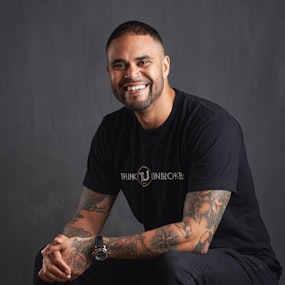
Michael Unbroken
Coach
Michael is an entrepreneur, best-selling author, speaker, coach, and advocate for adult survivors of childhood trauma.
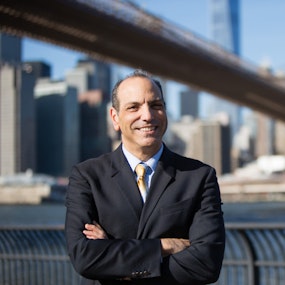
Martin Salama
L.I.F.E. Coach
You can use as much or as little as you like:
Martin Salama is known as The Architect of The Warriors L.I.F.E. Code.
He specializes in helping people frustrated in their life quickly shift their mindset to UNCOVER their greatness so they can live their true potential and enjoy LIFE!
An example of what he’s achieved is a client like Roberta, who lost her 6-figure job due to COVID and came to Martin depressed and felt very lost. Within a short time, she had, quote: “direction, focus, and a renewed energy around all the possibilities I could pursue… and getting back on track to enjoy LIFE!”
The key to his success is, he’s mastered the ability to Live Incredibly Full Everyday! Which he turned into the acronym L.I.F.E. and created the Warriors L.I.F.E. Code coaching program.
Welcome to The Think Unbroken Podcast!
Here are some of my favorite recent guests!



























